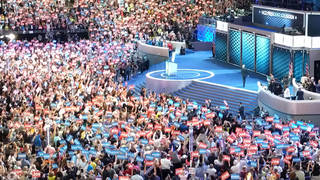
Thousands gathered over the weekend in Chicago for “The People’s Summit,” a major conference that brought together activists, community leaders and organizations to discuss what’s next for the progressive movement in the United States. The meeting began one day after Bernie Sanders announced he would not concede to Hillary Clinton. On the opening night, Juan González moderated a panel featuring Naomi Klein, John Nichols, Rosario Dawson and RoseAnn DeMoro of National Nurses United. Juan looked back to 1968 to examine the role activists took in that pivotal election year that saw the election of Richard Nixon. “Our slogan was 'Vote with your feet, vote in the street,'” said González, who was a member of SDS, Students for a Democratic Society. “I’m here to tell you that the slogan was right, the tactic was wrong.”
Transcript
AMY GOODMAN: Thousands gathered over the weekend in Chicago for The People’s Summit, a major conference that brought together activists, community leaders, organizations to discuss what’s next for the populist movement that helped fuel the [ 2016 ] presidential election. The conference began one day after Bernie Sanders announced he would not concede to Hillary Clinton.
SEN. BERNIE SANDERS: I recently had the opportunity to meet with Secretary Clinton and discuss some of the very important issues facing our country and the Democratic Party. It is no secret that Secretary Clinton and I have strong disagreements on some very, very important issues. It is also true that our views are quite close on others. I look forward in the coming weeks to continue discussion between the two campaigns to make certain that your voices are heard and that the Democratic Party passes the most progressive platform in its history, and that Democrats actually fight for that agenda.
AMY GOODMAN: Many key backers of Democratic presidential candidate Bernie Sanders attended The People’s Summit in Chicago, but organizers said the event wasn’t about any campaign in particular, but the future of the progressive movement in the United States. The event was organized in part by National Nurses United, the first national union to back Sanders as a presidential candidate last year. Today, we bring you highlights of the summit’s opening night panel discussion, moderated by Democracy Now!'s own Juan González. Panelists included author, climate justice activist Naomi Klein, and author and Nation contributor John Nichols, and actor and activist Rosario Dawson. We begin with Juan's opening remarks.
JUAN GONZÁLEZ: We’re going to try to get into where does this movement go from here, and hopefully we’ll be able to do it in a way recognizing our unities and our differences. But I want to share with you a brief experience of my own and the problems that I had in being able to deal with a presidential race.
It was 1968, right here in this city of Chicago. It was the Democratic National Convention of 1968. I was a young student right out of Colombia, the Columbia student strike of 1968, and we came to Chicago to confront the Democratic power brokers over the issue of the war in Vietnam and racism in America. Eugene—we had toppled the president. The movement had toppled the president, when Lyndon Johnson announced that he wasn’t going to run for re-election. And Eugene McCarthy had swept the country with young—his legion of McCarthy young people. Robert Kennedy had been killed in June of 1968, and it looked like the country was about to implode. We’re talking about 1968, when there was a riot not in one city, Ferguson or Baltimore; in April of 1968, there were a hundred riots in one week in the United States after the assassination of Martin Luther King. And so it looked like the country was on the verge of civil war.
And all of us from SDS and the anarchist group, which was at that time the Yippies, and a group called Up Against the Wall Mother[bleep] and the McCarthy kids, we all met in Lincoln Park to confront the power brokers. And, of course, there was tear-gassing, beatings. Richard Daley even had his police ordered to shoot people on sight who were—who he thought were looting. Our chant then was “The whole world is watching.” And the whole world was watching.
But the world got a different message than the one that we were putting forth. The result was, as many of you probably recall, Richard Nixon was elected president against Hubert Humphrey in a very narrow race, only because George Wallace was also running for president and got about 13 percent of the vote and siphoned off all of these supporters of the Democratic Party, white working-class folks, which began the huge Republican Southern strategy that prevailed for years to come.
We in SDS refused to vote. We wouldn’t support McCarthy. We wouldn’t support Humphrey. Our slogan was “Vote with your feet, vote in the street.” I’m—I’m here to tell you that the slogan was right, the tactic was wrong. And I think that the country, in retrospect, there would not have been a substantive change, there would have been a positive change, if Nixon had not been elected.
But you learn from your mistakes. Hopefully, other generations learn from the mistakes of those who came before them. So we’re going to open up this discussion now to discuss where does this movement go from here, this incredible movement. Do we seek to reform the system, transform the system, overthrow and replace the system? What are we trying to do?












Media Options